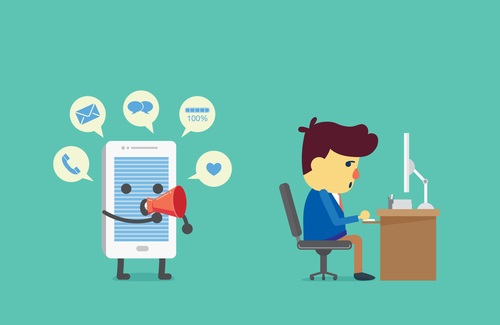10 Ways to Beat Distraction in the Workplace

By: Mary Ann Cook
The average office worker can only spend about 11 minutes on a specific task before being interrupted, according to research from Carnegie Mellon University’s Human-Computer Interaction Lab.
And distractions don’t just gobble up a surprising amount of time—they actually hurt your ability to learn. In the Carnegie Mellon study, participants who were interrupted during a standard cognitive skills test scored 20% lower than those who weren’t.
Whether you’re preparing for designation exams or just trying to stay focused at the office, here are five tactics for cutting distractions.
1) Break up the work. The concept behind the popular Pomodoro Technique is simple: Whenever you have a large task, break it up into smaller chunks with frequent breaks in between. Do one module and a quiz, then take a three- or five-minute break. Or set a timer for 25 minutes and work as much as you can, then take a five-minute break. After four of those sessions, take a longer break—15-30 minutes.
2) Pull out those earbuds. The so-called “Mozart effect” has not been verified, and even the original study noted a boost only in spatial reasoning, not general intelligence. Research suggests that music can distract you if it has lyrics that you know well enough to belt out in a karaoke contest.
3) Keep a distractions notebook. Not every distraction is frivolous. We often remember, out of the blue, important things we need to handle. Keep a notepad in your workspace to jot down anything important that pops into your head, whether it’s to pay a bill or look up a movie, and run through the list during your next break.
4) Use technology to your advantage. Technology has created countless new distractions that take hard work to ignore. But you can fight fire with fire—lots of tools can help you ignore those time-sucking websites and apps, by temporarily disabling Facebook when your fingers get the urge to scroll, for example. To get started, check out Strict Workflow, Freedom, StayFocused and Cold Turkey.
5) Tell people you’re unavailable. Whether you’re trying to avoid interruptions from co-workers or family members, some kind of “do not disturb” sign can work wonders. Stick a note on your door, retreat to an isolated part of your office or home, or send a message reminding everyone that you really don’t want to be disturbed.
6) Conserve your willpower. An interesting secondary finding from the Carnegie Mellon study found that individuals who expected to be interrupted, but never were, actually performed 43% better than the students who were never interrupted. Fending off distractions makes you work harder, but other research has found that this willpower is a limited resource. Make the most of the time you spend blocking out distractions by tackling the most challenging or least familiar subjects first.
7) Study more efficiently. Plenty of studying activities don’t actually help you master the material. During an average study session, keep a tally of how much time you spend on individual tasks. There’s no one-size-fits-all approach, but maybe you don’t need to read each passage twice or spend so much time organizing your notes.
8) Drink caffeinated tea. Here’s an easy one: Research suggests tea that contains caffeine and L-theanine can increase a drinker’s ability to ignore distractions.
9) Take care of yourself. Eat right and get enough sleep, especially right before exam time. Also make sure to exercise—it boosts endorphins and serotonin levels, increasing your ability to fight off distractions.
10) Flex your focus muscle. Build your ability to focus exclusively on your work material incrementally. When we try to do two or more things at once, we lose focus, and our ability to perform either task well decreases.
Mary Ann Cook is senior vice president of knowledge resources and content development at The Institutes.
Give InBonus tip: Once you get that urge to check Facebook or reach for your buzzing phone, the distraction has already won. You won’t be fully focused on your work until you eliminate it. Every once in a while, if all else fails, it’s OK to take 30 seconds and embrace the distraction. Once you’re done, you’ll have that much more space in your brain to devote to the task at hand. —M.A.C. |










